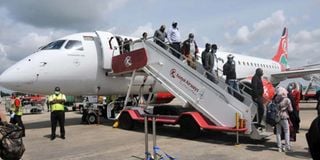Nairobi hub dream hangs on KQ

Passengers alight from Kenya Airways flight that made its first domestic flight at Moi International airport in Mombasa after opening of the skies.
What you need to know:
- Emirates, which is also eyeing the Nairobi hub has significant support from the government and like the Ethiopian competitor for KQ, it has not had a unionised staff that holds it at ransom like Kenya Airways.
Ethiopian, which is a key competitor in the African market for the Pride of Africa is currently building a Sh500 billion airport to expand its base in Addis Ababa.
Kenya’s plan to make Nairobi a major transport and logistics hub, faces a major test with survival and sustained return to the skies of its national carrier Kenya Airways.
The airline, which is now making a slow take off to fewer destinations after months of grounding due to Covid-19, has not been profitable for a few years and continues to muddle through various financial turbulence.
Aviation stakeholders who spoke to Smart Business last week contend that the potential for Nairobi as a major business hub is strongly tied to the success of its national carrier with other airlines likely to fill any gaps left by Kenya Airways.
According to Mr Michael Joseph who chairs the board of Kenya Airways, Nairobi is a jewel for many airlines that would be happy to fill in any opportunities left by the national carrier.
“If you look at what Emirates has done for Dubai and Rwanda Air is likely to do for Kigali, then it shows what having a national carrier can do towards making a hub. We have Africa companies headquartered in Dubai because of the connectivity they are able to get from Emirates. These firms can easily relocate because Nairobi has the perfect mix of good weather, excellent outdoor activities and good schools,”Mr Joseph told Smart Business in an interview in Nairobi last week.
Other airlines will not fly to Nairobi to just pay landing fees and use of airspace, a key strategy of major carriers involves fishing for passengers into their main hubs before flying them to other destinations in the world.
Subsidised carriers
Competition from other African and Middle East carriers has been part of the problem for Kenya Airways which can hardly compete with subsidised carriers and whose financial muscles have grown over time. They are not done just yet.
Ethiopian, which is a key competitor in the African market for the Pride of Africa is currently building a Sh500 billion airport to expand its base in Addis Ababa.
Ethiopian Airlines Group was originally established in June 1945 and is the flag carrier of the country fully owned by the government. From 2017 the airline took over Ethiopian Airports Enterprise and the rights and obligations of the Ethiopian Airports Enterprise were transferred to the Ethiopian Airlines Group.
This essentially put the expansion with the 35 square kilometre airport in Bishoftu, a town 39 kilometres south east of the capital, an expansion for the airline which already flew more than three times the destinations reached by Kenya Airways.
Bole International Airport in Addis Ababa has a passenger capacity of about 19 million annually and the expansion now makes the projected passenger numbers more than that of Dubai's international airport. The competition next door is huge.
“If you look at that kind of muscle around us, we only stand to lose because over the years, I have seen Ethiopian Airline increase its frequency of flights to Nairobi with the smaller aircraft feeding their 500-seater planes in Addis before flying them to other destinations. Of course Kenya is still struggling with the new approach to give a similar edge its competitors have,” a senior source within the aviation sector said, asking for anonymity not to be seen as talking of Kenya’s exposure to competition.
He said Kenya Airways which is currently operating at 35 percent capacity will need the government support similar or close to those enjoyed by its competitors to secure its Nairobi hub.
The same scenario has hit South African Airline after its authorities licensed other carriers into Johannesburg over the years and made it a major source market for passengers.
Post pandemic
The government then refused its request for more funding and when Coid-19 lockdown deepened its difficulties under the weight of heavy debt burden, the airline’s wings have been clipped months after the country opened airspace and as other carriers return to the skies, it remains unclear whether the carrier will operate even post pandemic.
Emirates, which is also eyeing the Nairobi hub has significant support from the government and like the Ethiopian competitor for KQ, it has not had a unionised staff that holds it at ransom like Kenya Airways.
Although stakeholders admit that pilot unions have become very costly and hard to handle in many jurisdictions because it takes quite a while to train pilots and the airline puts as much effort into trying to retain them, Kenya Airways has had a major challenge from these fliers.
KQ’s headwind was also fanned by the fire accident at the Jomo Kenyatta International Airport in 2013, a terror attack on Westgate Mall followed by an Ebola outbreak that meant Kenya Airways could not fly to West Africa. Various management miscalculations have also been pointed at as key reasons why its take off from losses remains difficult.
President Uhuru Kenyatta has already reorganised State logistics agencies, setting up a single entity in part of efforts to improve efficiency and cement Kenya's status as a regional transport hub.
President Kenyatta directed the establishment of Kenya Transport and Logistics Network that brings on board the Kenya Ports Authority (KPA), Kenya Railways Corporation (KRC), the Kenya Pipeline Company (KPC), and the Industrial and Commercial Development Corporation (ICDC).
“Lack of direct flights from Nairobi will be of immense disadvantage to Kenya and many people like to fly direct because it is faster. If it reaches a point when to go to Europe or even West Africa one has to connect due to lack of a direct flight from Nairobi then the hub will be much less attractive,”Mr Joseph said.
KQ has been seeking a new lease of life through the nationlisation plan after the parliament shot down its plans to take the management of the KAA. The move was stuck in parliament again after it was said to have skipped public participation.





